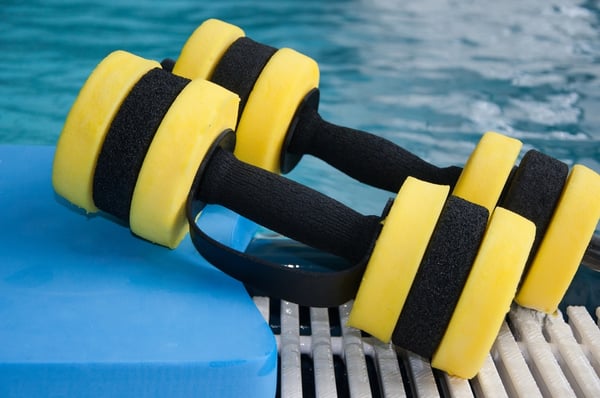When you think of physical therapy, do you picture a swimming pool? More athletes than ever are trying aquatic therapy to return to their sport faster and with less pain. Water offers many unique properties to help you recover from injury better than doing exercises on land. What makes water therapy different? Deb Walko, AT, EMT-B, CSCS, Lake Health Sports Medicine senior athletic trainer and injured-worker rehabilitation expert, explains:
Beneficial buoyancy
Water has buoyancy, which supports the body. Buoyancy is what makes you feel lighter in the water. This means less stress on weight-bearing joints such as your hips, knees and ankles. In fact, when you’re standing in waist-deep water, those joints receive only half the normal stress; in neck-level water, only 10 percent of the normal stress. Water’s buoyancy provides the additional support injured joints need to help them move in ways that would be painful or difficult outside the water. As a result, many people regain range of motion more quickly in water than they can on land.
Pressure
Water pressure is especially beneficial to people with a lower extremity injury. Studies show that the average-height person in water up to his or her neck experiences nearly nine times more pressure from the water than from an elastic bandage at the calf. This pressure helps to decrease swelling in lower extremity injuries. However, because of the effects water pressure can have on the chest cavity, patients with decreased respiratory ability may be advised against deeper water activities.
Resistance
Water’s resistance also contributes to the benefits of aquatic exercise. Resistance helps you increase strength, power and endurance. When resistance jets, such as those in the warm-water pool at the Brunner Sanden Deitrick Wellness Campus, are included in a rehabilitation program, activities such as running or swimming can be performed as part of the program progression. While water adds great resistance without equipment, you can add paddles or water weights to maximize resistance.

Other benefits
Water's other injury rehabilitation benefits include decreased pain, decreased muscle spasms, improved endurance, efficient strengthening, improved outlook and a quicker progression back to your favorite activities.
Where can I get aquatic therapy close to home?
Lake Health's rehabilitation team offers aquatic rehabilitation at the Brunner Sanden Deitrick Wellness Campus in our separate, warm-water therapy pool. The team specializes in treating a variety of issues, including sports injuries.
Our physical therapy/rehabilitation team at the Brunner Sanden Deitrick Wellness Campus can be reached at 440-354-1200. Patients can schedule initial physical therapy appointments through the Centralized Scheduling Department at 866-652-5253.

